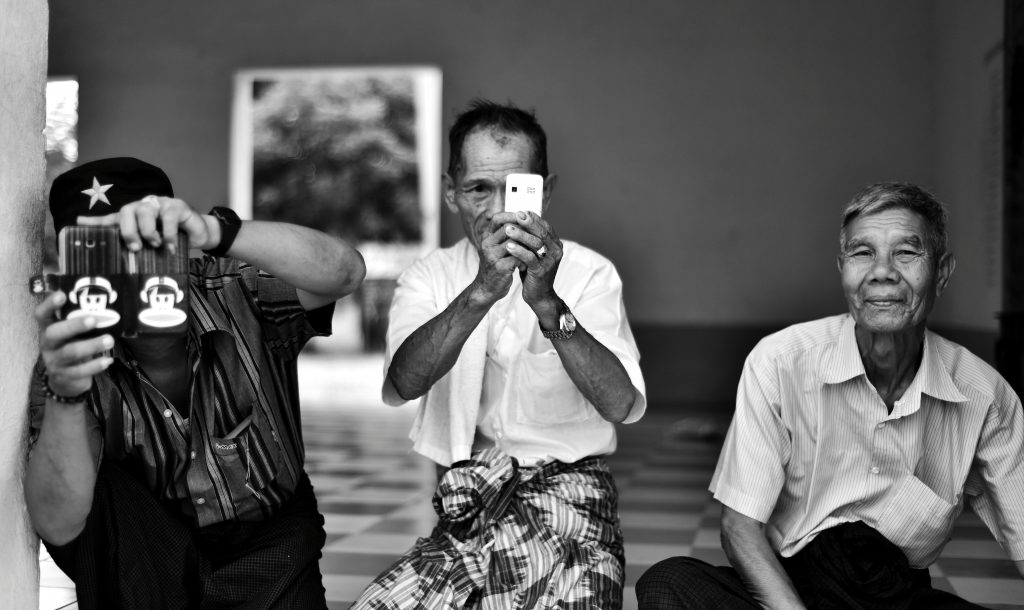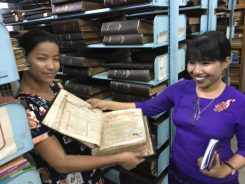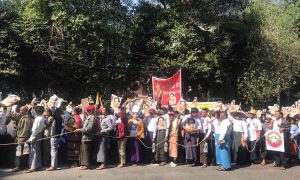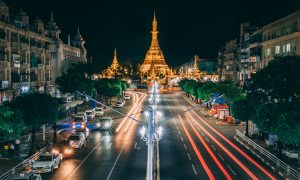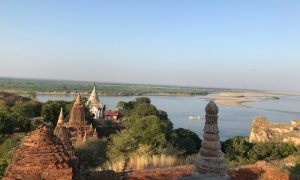This paper was first drafted for the Myanmar-Europe Research Network conference held at the University of Turin, Italy, in October 2019. A previous version was published, in Italian, as Nicholas Farrelly, “Alcune riflessionisul futuro degli studi sul Myanmar”, RISE Relazioni internazionali e International political economy del Sud-Est asiatico, February 2020, Vol. 4, No. 3, pp. 2-5. This English language version is published in partnership with the Torino World Affairs Institute.
Changing contexts
Changes in Myanmar society over the past decade have generated an adjacent transformation in the quality, quantity and diversity of academic scholarship. The number of Myanmar citizens actively involved in research activities has grown rapidly in Universities, thinktanks and the wide range of other institutions, including in the NGO sector, that produce knowledge about Myanmar. Many of these researchers receive support, directly or indirectly, from non-Myanmar sources, particularly governments. China, Singapore, the United States, Japan, Australia, Canada, the United Kingdom, and the European Union are all players, both in terms of their own contributions to the research landscape and their efforts as collaborative partners with Myanmar institutions.
At the same time, the number of foreign scholars devoting part or all of their research effort to Myanmar subject matter is at an all-time high. The major conferences on Myanmar affairs, whether in Myanmar, the United States or Australia are nowadays large and well-attended. The range of scholarship has also expanded dramatically. The terrain of debate about Myanmar affairs is, as a result, more cluttered than ever. This boom follows earlier periods where Myanmar Studies was a marginal concern, even in the research institutions that took it most seriously, such as the Australian National University, Cornell University, Northern Illinois University and the School of Oriental and African Studies in London. The multi-year lag in conventional scholarly publication means that the current boom will continue to build momentum, even if, due to COVID-19 and other disruptions, specific opportunities for researchers in Myanmar are curtailed. Access for foreign researchers and freedom of enquiry for Myanmar scholars both improved greatly during the 2010s, but it is, right now, unclear whether those trends will continue. Beyond the current health and economic crisis gripping the world, there are early indications that powerful interests in Myanmar, including the National League for Democracy, are uncomfortable with serious academic scrutiny of their policies and actions. Obviously, the new coronavirus introduces unpredictable dynamics in many directions.
As part of the broader academic stocktake at this moment of such great uncertainty, the recent expansion of Myanmar Studies should motivate critical reflection. In this analysis, I briefly set out how we might understand the evolution of Myanmar-focussed analysis and what its current condition suggests about the future of research on this important and often troubled Southeast Asian country. One of the reasons for this assessment is that my own academic interests are shifting in other directions and so it makes sense to consider what I have learned over almost 20 years in and around the Myanmar Studies community. I am grateful to the many friends, mentors, interlocutors, informants, students and collaborators who have made it possible for me to learn something about some of Myanmar’s many facets. Much of what I presume to know is the result of the hard work of generations of scholarly contributors, especially those who sought to understand Myanmar during the dark decades of military dictatorship. While I started my own academic career under those conditions, I am also aware that I have tended to enjoy safe access of a type available only to the most privileged, and lucky, in the Myanmar Studies community.
Humanising the Myanmar Studies boom
While my career studying Myanmar stretches back to the early 2000s, I have, like so many others, benefited greatly from the types of collaborations that have been made possible by Myanmar’s more recent political, social and economic changes. Learning alongside Myanmar colleagues has proved a particularly important part of this story in the past decade. Through supervision of Myanmar PhD students and various efforts to co-produce scholarship, many of us have built collaborations which were generally not possible for previous generations. Indeed, my own close scholarly interaction with Myanmar government officials, drawn from across at least half-a-dozen different Ministries, has proved hugely important in terms of how I understand Myanmar society in all its different permutations. I still remember the first time I entered a government compound, my first visit to Naypyitaw, my first time drinking tea with an old General. I also recall the first time I sat with young rebels and the first time I heard gunfire on the wind. All of these stories have needed to be told.
It is particularly heartening that Myanmar voices, whether as journalists, analysts or scholars, are now doing more of the story-telling than ever before. Those of us who stumbled, as outsiders, into trying to understand Myanmar affairs should continue to find as much space as possible for their perspectives. That means ensuring the flow of Myanmar students to quality international institutions can continue and that those students receive an education not only in their narrow field of future expertise but in the mechanisms that drive knowledge and debate around the world. Obviously, this requires scholarship funding at a sustained and significant level. Wealthy countries that offer generous scholarship support will only sometimes reap immediate benefits, but it seems only right that Myanmar students are supported to participate, including at the elite level, in the scholarly work that directly effects their country and its people. Wherever possible, such scholarships should be made available to officials, activists, academics and journalists who all, in their different careers, can make a huge difference to Myanmar’s ability to manage its many challenges.
Simply as a matter of bluntly stating the obvious, it is plain that, for the future good health of Myanmar Studies, an increasing load should be shouldered by Myanmar citizens, and also by members of the vast Myanmar diaspora. Their language skills and local insights, as well as what are often deep commitments to social and educational development in their own country, have already greatly refreshed understandings of many key issues. Thinking about some of the best publications of recent years, they are sole authored products of Myanmar people, or the joint productions of Myanmar and non-Myanmar scholars and institutions. Edited volumes that once would have showcased relatively few Myanmar voices are now packed with the impressive insights of those who have lived for long periods within Myanmar cultural frames.
Today’s challenges
Nonetheless, Myanmar scholars still struggle, every day, with a range of constraints: for a start there is the lack of resources and esteem within the Myanmar higher education system, and a parallel long-term estrangement from global academic norms. Since the hesitant opening of Myanmar Universities from 2011 onwards, resulting in bigger undergraduate student numbers and more opportunities for travel and research, it is true that much has changed for the better. Yet for academics working in these under-funded institutions, there is still constant exasperation that comes from managing the needs of a hungry local audience with the demands of any international partnerships. Those who want to engage with Myanmar collaborators and with the local academic community need to appreciate the intellectual histories that matter in these contexts, if, as outsiders, we are to find optimal ways to secure resources that help build local research capacity.
One key issue around such partnerships relates to the erratic enthusiasm for Myanmar Studies outside the country. The recent “high water mark”, if that is a fair analogy for such complex and multi-faceted trends, was from 2014-2016, just before and then immediately after the 2015 general election. Before the election, researchers benefited from the increasingly liberal climate on Myanmar University campuses and from the significant resources that flowed into the country for analytical efforts. The Program in Modern Burma Studies at the University of Oxford and the ANU Myanmar Research Centre in Canberra both trace their formation to these crucial years. So do many other knowledge-focussed initiatives, such as the Myanmar-Europe Research Network hosted by the University of Turin. It helped that in the lead-up to the November 2015 election the National League for Democracy could be credibly described as a force for positive change in the country. Since 2017, much analysis in Myanmar Studies has shifted to the crucial work of understanding anti-Rohingya violence, the re-entrenchment of civil wars across the northern and eastern borderlands, and the policy problems faced by the NLD as it built a loose coalition with militarist and conservative voices.
When we consider the evolution of Myanmar Studies through the 20th century and into the 21st century, it is therefore worth appreciating the extent to which the recent level of interest is unusual. Professor Andrew Selth’s meticulous work as a bibliographer must, in this respect, be recognised for the way that it explains the recent boom. Selth began as an analyst of Myanmar affairs in the early 1970s, originally in the Australian government’s foreign service, and has since built a remarkable private collection of Myanmar research materials and ephemera. His deep knowledge of the different strands of Myanmar Studies work now accumulated in his bibliography showcase the challenges of keeping track of what is, these days, a voluminous annual output of new books and other contributions. He has told me that the job of monitoring all of the published work is now overwhelming, even for somebody with his years of experience and commitment.
Connecting Myanmar libraries to global academia
The eLibrary Myanmar Project is helping libraries make the leap from isolation to digitisation, both of their own outstanding collections and global publications.
The Rohingya crisis
The most serious of these debates also happens to have greatly battered Myanmar’s global standing. Since the 2017 exodus of Rohingya Muslims from Rakhine State to Bangladesh, Myanmar has, at the official level, sought to convince the world that it did not conduct a campaign of ethnic cleansing. How does this dramatic and devastating situation fit into the future of Myanmar Studies? Previously, many scholars invested heavily, at least in a general sense, in the success of the fragile democratic transition. Their analyses of the political changes tended, naturally enough, to consider the positives and the negatives, the risks and the opportunities, of Myanmar’s shifting conditions. Many warned about the potential for further violence in northern Rakhine State and worried, out loud in academic registers, about the deep antipathy that so many people in Myanmar feel towards Muslims. The Rohingya were, many feared, a permanent target for further discrimination and worse. Dealing with these issues in academic terms can be frustrating. On the question of the Rohingya there are deep divisions, often, between Myanmar and non-Myanmar scholars. The non-Myanmar voices are often louder, and that can lead to new types of resentment among Myanmar academic colleagues. Sadly, some Myanmar scholars are not prepared to accept different interpretations. Friendships have soured, and sometimes been destroyed.
With its reputation now sullied beyond recognition, the elected Myanmar government asks for forbearance and insists that replacing what was, until 2010, Southeast Asia’s most durable military dictatorship comes with many costs and compromises. Such voices tend to ignore how State Counsellor Aung San Suu Kyi and many other figures in the fusion democratic-military government will never recover their previous reformist credentials or the generosity they could expect from friendly foreign backers. Behind closed doors, when the diplomatic niceties are put away, there is ill-disguised disgust for Myanmar’s senior decision-makers and their callousness towards the Rohingya. Aung San Suu Kyi, through her public legal defence of the anti-Rohingya pogrom in late 2019 in The Hague, is now forever linked to what was allegedly a genocidal campaign.
In political terms, as Myanmar now gallops towards the planned 2020 general election, the aftershocks of the Rohingya crisis will continue to dampen enthusiasm, in western capitals, for Aung San Suu Kyi’s political dominance. But what is the alternative? A return to direct military rule? Senior players in Naypyitaw know, from a lifetime of experience, that among the wide range of well-established authoritarian regimes in Myanmar’s immediate neighbourhood Aung San Suu Kyi will inevitably find continued backing. For different reasons, she is still welcome from Beijing to Brunei, and all the way to Budapest. Less so in London, Washington or Canberra. When, in January 2020, the International Court Justice in The Hague imposed interim measures on Myanmar to prevent future acts of genocide against the Rohingya the politics of international scholarly engagement entered a new and even more difficult phase.
What next?
How scholars respond to these conditions, over the long term, will be a test of collective resolve and courage. It is easy, in academic life, to spend all of your time engaging familiar audiences in a straightforward manner, particularly when there is widespread agreement, even consensus, on key points of analysis. It is much more difficult to regularly engage with those who offer contrasting perspectives, or direct and unflinching rebuttal. On the Rohingya, there is no doubt that analysts draw different conclusions and that different histories, with respect to ideology and identity, but also in terms of academic culture, come to the fore. Future legal proceedings, at the ICJ or elsewhere, will test all of these differences of interpretation.
My final thoughts are therefore about how the Myanmar Studies academic community can best manage the challenging conditions we face over the years ahead. First, we should treat countervailing perspectives with respect and empathy, and look for opportunities to learn from those with whom we disagree. Second, there is a need to appreciate that Myanmar Studies will remain sufficiently small that everyone should find ways to collaborate and draw the different cohorts together. That is why international collaboration remains key, whether through the Myanmar-Europe Research Network or other channels. Third, the scholarly community has a special responsibility, under today’s difficult conditions, to continue pushing deep into the borderlands and beyond, looking for opportunities to understand the linkages that make Myanmar such a vibrant place for study. The cross-border calamity of the Rohingya needs to be at the top of any serious research priority list. Finally, we all need to manage powerful interests in Myanmar with care: they are not going to disappear and that is why the NLD, Naypyitaw, the army and the key ethnic militias all need to be treated as important research subjects, with support given to those scholars who, inevitably, take risks in trying to push the knowledge frontier.
That frontier looks different now than it did even a few months ago. As analysts, we already confront the grave and wide-ranging upheavals that 2020 has brought. Myanmar’s planned election for late in the year will be influenced, no doubt, by the economic and strategic turbulence that COVID-19 has unleashed. The contraction of the Chinese economy is a key factor, but the unknown consequences elsewhere in the world, including in the western democracies that have been so supportive of electoral reform, introduce new risks for Myanmar. Foreign development assistance is likely to taper off, at least for a period. But will it return in a recognisable format? The answer to that question will have consequences for research of all kinds, for many years to come. We also know from Myanmar history that economic shocks often generate serious political upheaval. Under these daunting conditions, Myanmar’s leaders have appeared, until just a few days ago, blasé about the spread of the new coronavirus within their borders. Yet, it is the story outside Myanmar that will now shape, and seriously constrain, so many of the decisions that its leaders face. For the next generation of Myanmar scholars, whatever their backgrounds or ambitions, there will be much work required to support knowledge creation throughout this time of fear, change and hardship.
 Facebook
Facebook  Twitter
Twitter  Soundcloud
Soundcloud  Youtube
Youtube  Rss
Rss 